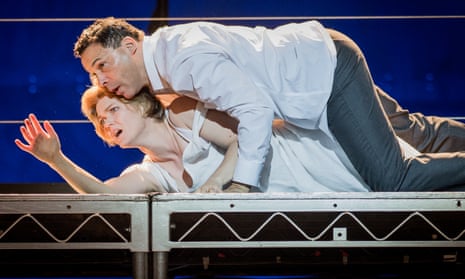Swiss composer Frank Martin’s music is nowadays little heard, and his secular oratorio Le Vin Herbé even more rarely. Polly Graham’s stark but brilliant new staging of the work for Welsh National Opera might just change all that.
Basing his piece on Joseph Bédier’s take on the legend of Tristan and Iseult, and using a small chamber ensemble, Martin deliberately took his work as far from Wagner’s epic setting and the latter’s Nazi associations as he could. Boldly opening the Millennium Centre stage into a massive, bare expanse, Graham puts the musicians – and thus the music – centre stage, placing them just in front of a wide metal bridge, steps leading up either side, with lighting rigs breaking up the blackness. Martin’s narrative – primarily delivered by the chorus and sung here in English – proceeds with the utmost simplicity, the music never indulgent but, particularly in the accompaniment – string sextet plus double bass and piano – creating an atmosphere of sensual, mystical beauty. The ritual of life, love and death unfolds with a quiet but unerring monumentality. Moments of theatrical gesture are few but strong: when Iseult’s companion Brangien (Rosie Hay) realises she has mistakenly given her mistress and Tristan the love potion – the eponymous vin herbé – in anguish, she hurls the glass vessel over what is now the bridge of their ship. It shatters. A final pietà with the chorus placing candles next to the body of the dead Tristan also has an iconic feel.
Tom Randle’s Tristan is understated but takes on a quiet nobility, while Caitlin Hulcup is a magnificent Iseult. Her voice has an expressive richness throughout her mezzo range. Movement director Jo Fong ensures that the chorus – whose acting is as involving as the singing – changes from being omnipresent to being almost invisible. Such was the immediacy and intensity that the audience was held still throughout. Further performances are precious few: catch them.

Comments (…)
Sign in or create your Guardian account to join the discussion